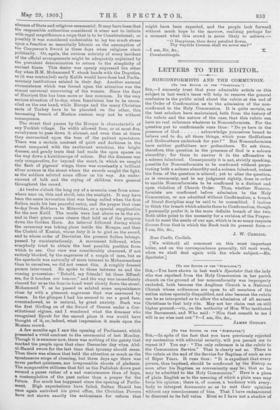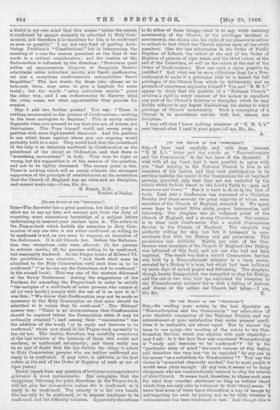[To THR EDITOR Or TIlS " SPROTATOR.1
SIR,—In spite of the fact that you have previously rejected my contention with editorial severity, will you permit me to repeat it ? You say : " The only reference is in the rubric to the Communion Service." That is clearly not so. There is the rubrio at the end of the Service for Baptism of such as are of Riper Years. It runs thus: "It is expedient that every person, thus baptised, should be confirmed by the Bishop so soon after his Baptism as conveniently may be; that so ho may be admitted to the Holy Communion." Here is a piece of plain English as to the meaning of which a plain man may form his opinion; there is, of course, a tendency with every- body to interpret documents so as to suit their opinions without any consciousness of bias. That I have endeavoured to discount to its full value. Even so I have not a shadow of
a doubt in my own mind that this means "unless the person is confirmed he cannot normally be admitted tp Holy Com- munion, and therefore it is expedient for him to be confirmed as soon as possible." I am not very fond of quoting Arch- bishop Peckham's " Constitutions," but in interpreting the meaning of a rule the custom prevalent at the time it was made is a critical consideration ; and the custom at the Reformation is indicated by the direction: " Statuimus quod nullus ad sacramentum Corporis et Sanguinis Domini adnaittatur extra articulum mortis, nisi fuerit confirmatus, vel nisi a receptione confirmationis rationabiliter fuerit impeditus." The last words, for those who choose so to interpret them, may seem to give a loophole for some laxity ; but the words " extra articultun mortis " point the other way, and I am endeavouring to discover what the rules mean, not what opportunities they provide for evasion.
May I add two further points P Tou say : " There is nothing sacramental in the process of Confirmation,—nothing in the least analogous to Baptism." This is surely rather dogmatic when you proceed to say that you are, of course, not theologians. The Pope himself could not sweep away a position with more high-handed dismissal, And the position is one which those against whom you are arguing would probably hold to a man. They would hold that the priesthood of the laity is as definitely conferred in Confirmation as the priesthood of the clergy at Ordination, and that there is "something sacramental" in both. They may be right or wrong, but the supposition is of the essence of the question, and not to be lightly dismissed. The second point is this. There is nothing which will so surely alienate the strongest supporters of the principle of establishment as the contention that the Church of England bee no rules and no discipline, and cannot make any.—I am, Sir, &c.,
T. FIELD, D.D.,
Warden of Radley.







































 Previous page
Previous page